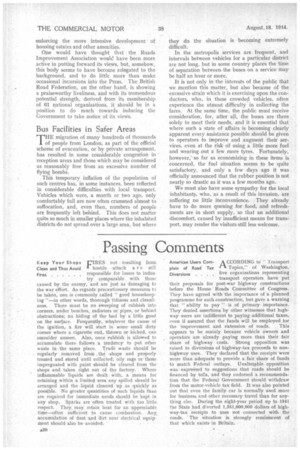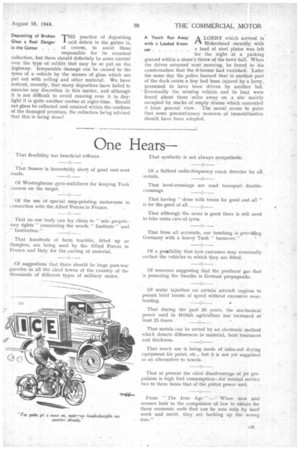Passing Comments
Page 22

Page 23

If you've noticed an error in this article please click here to report it so we can fix it.
Keep Your Shops rIRES not resulting from Clean and Thus Avoid hostile -attack a re still Fires responsible for losses to indus
try comparable with those caused by the enemy, and are just as damaging to the war effort. As regards precautionary measures to be taken, one is commonly called " good housekeep• ing "—in other words, thorough tidiness and cleanliness. There must be no sweeping of rubbish into corners, under benches, radiators or pipes, or behind obstructions; no hiding of the bad by a, little good on the surface. Frequently, whatever the cause of the ignition, a fire will start in some small dirty corner where a cigarette end,, thrown or kicked-, can smoulder unseen. Also, once rubbish is allowed to accumulate there follows a tendency to put other waste in the same place. Trade waste should be regularly removed from the' shops and properly treated and. stored until collected; oily rags or-those impregnated with paint should be cleared from the shops and taken right out of the factory. Where inflammable liquids are dealt with, a means lotretaining within a limited area any spilled should be arranged and the liquid cleaned. up as quickly as possible. No greater quantities of such liquids than are required for immediate needs should be keptin any shop. Sparks are -often treated with too little respect. They may. retain heat for an -appreciable time—often sufficient to cause combustion. Any accumulation of dust and dirt near electrical equipment should also be avoided. American Users CornA CCORDING to " 'transport plain of Road Tax CITopics," of Washington, Diversions . five organizations representing
transport operators, have put their proposals for post-war highway constructions before the House Roads Committee of Congress. They have agreed with the importance of 'a planned programme for such construction, but gave a warning that "ability to pay" is of primary importance. They denied assertions by other witnesses that highway users are indifferent to paying •additional taxes, even if assured that the funds will be employed for
the improvement and extension of roads. This appears to be mainly because vehicle owners and operators are already paying more than their fair share of highway costs. Strong opposition was raised to diversions of highway-tax proceeds to nonhighway uses. They declared that the receipts were more than adequate to provide a fair share of funds to match Federal outlays. Unalterable opposition was -expreSsed to suggestions that roads should be financed by tolls, and they endorsed a recommendation that the Federal Government should withdraw from the motor-vehicle tax field. It was also pointed out that even the family car is normally used more for business and other necessary travel than for anything else. During the eight-year period up to 1941 the State had diverted 1,351,000,000 dollars of highway-tax receipts to uses not connected with the roads. The situation is strongly reminiscent of that which exists in Britain. •
Depositing of Broken Glass a Real Danger in the Gutter . . .
T"practice of depositing raid debris in the gutter is, of course, to assist those responsible for its eventual collection, but there should definitely be some control over the type of rubble that may be so put on the highway. Irreparable damage can be caused to the tyres of a vehicle by the masses of glass which are put out with ceiling and other material. We have noticed, recently, that many depositors have failed to exercise any discretion in this matter, and although it is not difficult to avoid running over it in daylight it is quite another matter. at night-time. Should not glass be collected and retained within the confines of the damaged premises, the collectors being advised that this is being done?
Birkenhead recently with a load of steel plates was left for the night at a parking ground within a stone's throw of the town hall. When the driver returned next morning, he found to his consternation that the 6-tonner had vanished. Later the same day the police learned that in another part of the dock estate a boy had been injured by a lorry, presumed to have been driven by another lad. Eventually the missing vehicle and its load were found about three miles away on a site mainly occupied by stacks of empty drums which concealed it from general view. The moral seems to point that some precautionary measure of immobilization should have been adopted. A Youth Ran Away with a Loaded 6-tonner




























































